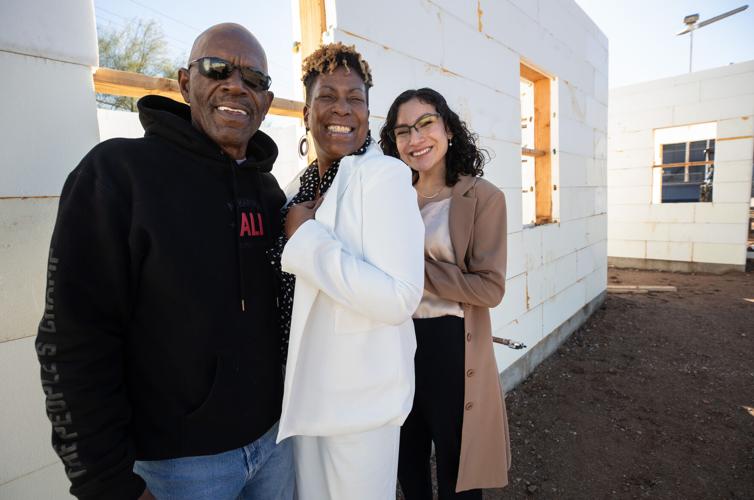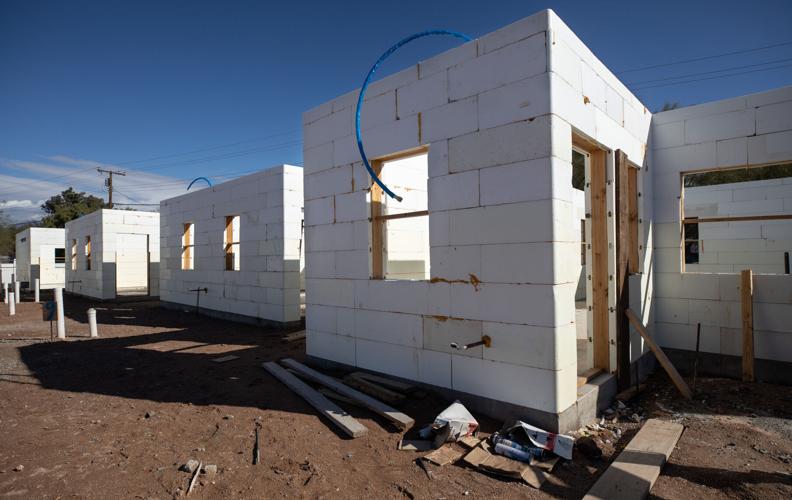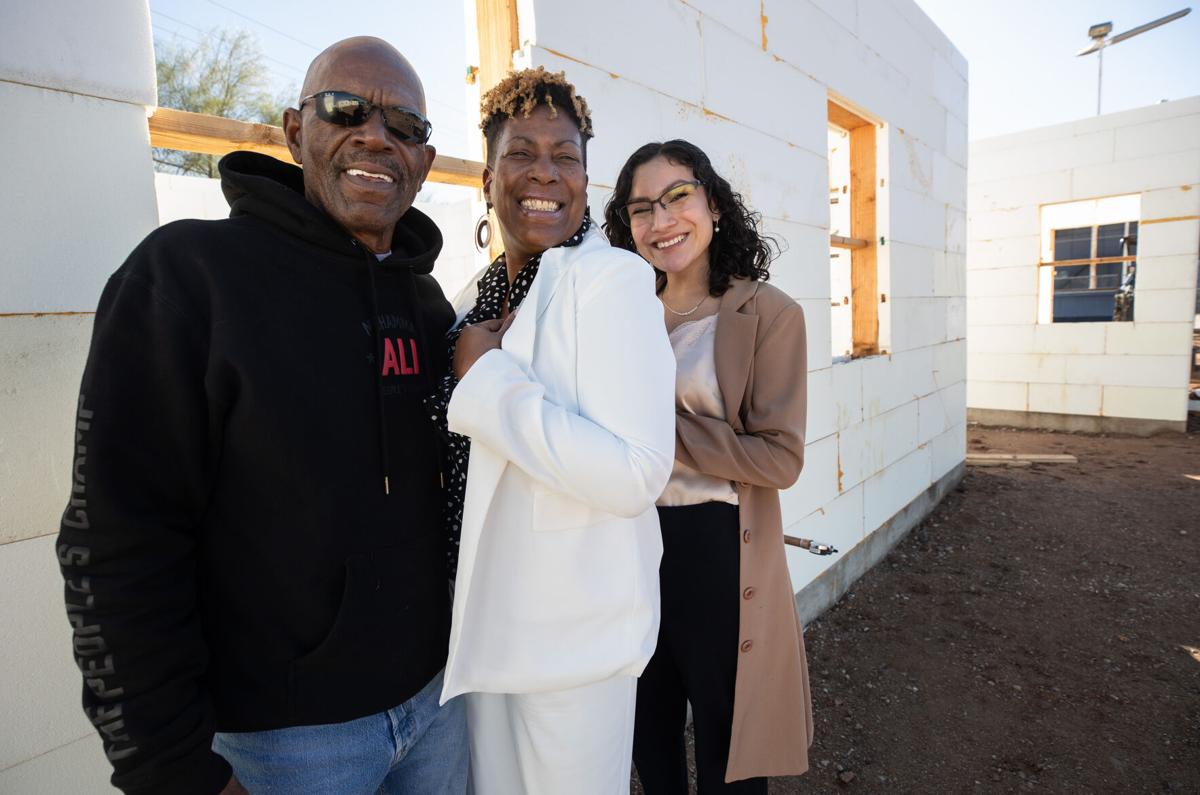Construction on a Tucson village of small homes for youths transitioning out of foster care is well underway, with six of the 10 buildings complete and the remaining four to be erected soon.
I Am You 360 was started in late 2013 by Desiree Cook, who decided to use her experiences to help the community. Cook’s previous struggles with addiction landed her in prison and her children in foster care.
She also experienced homelessness before making the decision to reinvent herself.
During its first several years, the group’s focus was preparing and providing customized hygiene bags for kids and teens in foster care, but in recent years efforts have expanded to include housing solutions for former foster youths.
In 2021, Tucson developer Louis Blass of Crest Contracting granted Cook use of a renovated apartment complex, which 10 young adults from diverse backgrounds and ethnicities call home. They meet regularly for classes that teach life skills and self-development and have worked together to grow vegetables in an on-site community garden.
And while the apartments are a safe, temporary option, Cook’s dream plan is to purchase properties and build small home villages across Tucson.
The idea is to buy the land and to bank half of each resident’s $1 per-square-foot rent, which they pay on the 450-square-foot home, into a savings account that the person can later use for a down-payment on a starter home of their own once they’re ready to move out.
In March, Cook broke ground on the first village, adjacent to I Am You’s east-side office, on an empty lot that sat vacant for decades. The foundation has been laid and walls built for the community center and five of the nine homes, thanks again to Blass and Crest Contracting, who are working with Cook on a pay-as-you-go basis.
“No other contractor would pick us up unless we had the full $1.5 million,” Cook said. But Cook’s message resonated with Blass, who directed his construction manager Shawn Berna to do what they could to help the cause.
The funding for the first five homes and the community center came from a city of Tucson American Rescue Plan Act grant, OneAZ Credit Union and the community. The final four homes were paid for by the community, including a handful of local nonprofits, Cook said, adding that roofs, windows and doors have not yet been funded.
“Five years it’s been in the making and to see it coming to fruition is not only humbling, but the fact that Arizona (ranks high in the nation for) homelessness, it’s a necessity,” Cook said. “We are firm believers in this project primarily because invest now, or pay later. Either way, you’re going to pay. Your tax dollars are going to go to things that you may not support.”
I Am You 360’s donors can see where their money is going either through the group’s social media accounts or simply by driving by, Cook said.
“The community has helped us get to where we’re at now, so I feel that we owe the community to see where their dollars are going,” she said. “This is an ‘us’ effort.”
The Tucson nonprofit I Am You 360 broke ground in March on its small home village for youth transitioning out of foster care. The foundations have been laid and walls built for six of the 10 buildings and work on the final four is underway. Video by Caitlin Schmidt / Arizona Daily Star.
‘The residents’ voices can be heard’
Cook and Berna hope the remaining four homes, already paid for, will be built this spring, if weather allows.
The next step will be roofs, windows and doors, which Cook is currently raising $500,000 to cover. Because Crest has other jobs, it is able to step away from this project and resume work when funding allows.
In December, Cook received a $5,000 donation from local nonprofit 100+ Teens Who Care Tucson and earlier this month, Pima County supervisors voted to allocate $5,000 in funds to help with framing and doors for five of the homes. But Cook still has a long way to go.
She estimates she still needs to raise a total of $800,000 to $1 million to complete the first village, including roofs, windows, doors, landscaping, irrigation, a gazebo, community garden and water harvesting setup. The landscaping should cost $150,000, she said, and Cook hopes to collect in-kind donations for things like toilets, sinks, fixtures and more.
“These kids are victims of sex trafficking, human trafficking, the judicial system. There are so many pieces that they have to navigate through life just to survive. I’ve been praying for a million-dollar donor,” Cook said.
The village will include a 250-square-foot community room for classes, meetings with therapists and eventually, podcast production.
“So the residents’ voices can be heard on topics that are concerning to them regarding their lived experiences,” Cook said. “The crisis that we’re in and their lived experiences matter, but also knowing that there are millions of kids that are experiencing the same. That’s huge.”
Berna, the construction manager, said it’s been fun to watch Cook network and fundraise to make her dream come true.
“My lived experiences have really given me the resilience and persistence,” Cook said. “I’ve been homeless. I know what it’s like to go from pillar to post and not have your children because they’re in foster care. I think that helps rev up my engines.”
“All the energy I put into my drug addiction and my illegal activity, I have bottled that up now and transitioned that for the good of the community.”
Cook said she believes she’s had to work harder to build trust because she’s an African American woman. Berna said Blass has said the same about Cook. “It makes me sad, because that shouldn’t be a real thing,” Berna said.
Cook said she has to shake that off, since this is about the kids, and the population her project supports is a group that statistically has fallen through the cracks.
“It’s up to us to sew them back into the fabric of the community so we can have some better outcomes,” she said.

Four of 10 tiny homes under construction at the I Am You 360 development at 1131 S. Van Buren Ave., which provide housing for youths transitioning out of foster care in Tucson.
Success rate
I Am You 360 has already seen improved outcomes at the apartment complex that serves as phase 1 of the project. Cook said they’ll continue to use the 10-housing model, because they’ve seen that it works.
“It’s easier to dissect problems, it’s easier to unify. You have 10, it holds everybody accountable,” she said. “You become your own neighborhood watch in the community, and that’s what we’ve seen. It hasn’t been perfect, but we’ve seen about an 80% success rate.”
Cook said two of the original residents have left the apartment on their own under positive circumstances. One young woman was able to rebuild a healthy relationship with her mother and ended up moving back home. A second resident with family support decided to move in with her sister, believing that someone else needed the program more. Two new residents have taken their spots.
Residents cook for one another, watch each other’s children and had a “Friendsgiving” celebration. They take classes, including banking, budgeting, self-defense and more, thanks to community partners who want to help.
“It’s cool to see,” Berna said. “You’re teaching kids who wouldn’t have had the opportunity to be adults. That’s not the stuff that’s taught in school, it’s the stuff you’re taught by your parents or by watching it. But if you don’t get to see that, how do you know it? And now they’re able to do it amongst themselves.”
Cook said this experience will not only teach residents how to build relationships, but will also connect them for the rest of their lives.
“It’s a very intimate relationship that we have set up with them,” she said. “We have one that’s graduated and gotten his GED, we’ve had residents purchasing their first cars. One just graduated from cosmetology school, passed and got her license. We have one that’s a head cook, one that’s a home health aide. This is what we’re producing. It’s not just about giving them a home.”
‘Makes me feel good’
Six months ago, Cook retired from her career as a hairstylist to work on I Am You 360 full time.
In the months that followed, new staff members have joined the nonprofit, including 18-year-old Mariah Phifer, who moved to Tucson from North Carolina a few months ago with her daughter. She’s been working as the hygiene dispensary coordinator for the past two months, serving dozens of families in the community.
“We help so many people. It’s amazing,” Phifer said.
Phifer was referred to the position by Goodwill Metro, with Cook saying her lived experience makes her a perfect fit for I Am You 360. She also works as a program facilitator with Girl Scouts of Southern Arizona and is attending night school. She eventually would like to do hospital work and start her own nonprofit for teenage mothers and domestic violence victims.
“I was escaping a (domestic violence) relationship, so coming here and helping other young girls that are like me and just helping them with their self-esteem, if somebody would have done that for me, I probably would have never felt trapped,” Phifer said. “For me to be able to be a part of that makes me feel good.”
Jasmine Angulo works as community liaison for the current residents and the application coordinator for the small home village. She also helps teach the I Am Somebody self-development classes.
Angulo, now 21, met Cook when she was 14 through a summer program called Project Pearl.
“Desiree came up to me the last day and said, ‘I think you would like this,’” Angulo said, referring to I Am You 360’s class curriculum. “She would come every week to the Boys and Girls Club I was going to and she would train me for an hour every week, and then I was able to have my own I Am You 360 class at the Boys and Girls Club for 10 weeks straight.”
Angulo said she’s been involved ever since, taking on a “big girl job” with the nonprofit about a month ago.
“It’s really exciting to be giving back to my community in such a great way and also be paid for it,” she said. “Desiree always likes to hire youth that want to give back and it’s empowering the whole person.”
Angulo has been tasked with reviewing dozens of applications for the small home village and Phase 1 apartments. Some are waitlisted and if the applicant isn’t a good fit, they’re provided with resources and words of encouragement so that the interaction ends on a positive note.
“Tucson is full of resources,” Angulo said. “We’re not trying to reinvent anything, we’re just trying to help people out. And when we can’t help, somebody in the community can help them.”






